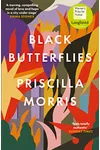Picture a British-Bosnian storyteller who turned the heartbreak of war into a hauntingly beautiful novel—meet Priscilla Morris! With her debut, Black Butterflies, she captured the Siege of Sarajevo through the eyes of an artist, weaving a tale of resilience and hope that’s left readers spellbound. A creative writing lecturer with a knack for bridging cultures, Morris’s multicultural roots and evocative prose make her a rising star in literary fiction.
Born to a Bosnian mother and a Cornish father, Morris grew up in London, spending sun-soaked summers in Sarajevo. Those childhood visits to her mother’s hometown planted seeds of inspiration that would bloom decades later. Now splitting her time between Ireland and Spain, she crafts stories that pulse with the vibrancy of her heritage and the weight of history.
The Making of Priscilla Morris
Priscilla Morris’s journey to authorship was anything but ordinary. Raised in London, she was steeped in the stories of her Bosnian family, especially during the Yugoslav Wars when relatives fled the Siege of Sarajevo to her family’s home. Her father’s daring 1993 rescue of her grandparents, armed with a Times press pass, became a family legend. Morris studied Spanish, Italian, and Social Anthropology at Cambridge University before earning an MA and PhD in Creative Writing at the University of East Anglia. Her academic path, combined with stints living in Barcelona, Rio, and Sarajevo, shaped her global perspective and fueled her storytelling. Teaching creative writing at University College Dublin, she now mentors aspiring writers while penning her own works.
Priscilla Morris’s Unforgettable Stories
Morris’s debut novel, Black Butterflies (2022), is a literary triumph, shortlisted for the Women’s Prize for Fiction 2023, the RSL Ondaatje Prize, and more. Set during the 1992–1996 Siege of Sarajevo, it follows Zora, a Bosnian Serb artist who clings to her art amid chaos. Inspired by Morris’s great-uncle, painter Dobrivoje Beljkašić, whose studio burned in the National Library fire, the novel blends raw emotion with vivid imagery. Its present-tense prose pulls readers into the immediacy of war, while Zora’s resilience offers glimmers of hope. Translated into multiple languages, including Bosnian, Italian, and Dutch, it’s a global love letter to Sarajevo’s multicultural spirit.
Morris’s style is lyrical yet unflinching, balancing the brutality of conflict with the beauty of human connection. Her research—five months in Sarajevo interviewing survivors—lends authenticity to every detail, from the scarcity of water to the camaraderie of neighbors. While Black Butterflies remains her sole published novel, Morris is reportedly working on her next book, promising more stories that explore resilience and identity.
Why Priscilla Morris Matters
Priscilla Morris’s work resonates because it humanizes history. By centering an artist in a warzone, she shows how creativity can defy destruction, offering a fresh lens on the Bosnian War. Her multicultural perspective challenges divisive narratives, celebrating Sarajevo’s pre-war harmony. For readers, her stories are both a history lesson and a testament to the enduring power of art. As a lecturer, she inspires new voices, ensuring her influence extends beyond the page. In a world still grappling with conflict, Morris’s message of hope and community feels timelier than ever.
- Born: To a Bosnian mother and Cornish father in London
- Key Work: Black Butterflies (2022)
- Awards: Shortlisted for Women’s Prize for Fiction 2023, RSL Ondaatje Prize, and others
- Current Role: Creative Writing Lecturer at University College Dublin
Snag Black Butterflies and dive into Priscilla Morris’s lyrical world of resilience and hope—it’s a read that’ll stay with you long after the final page!
